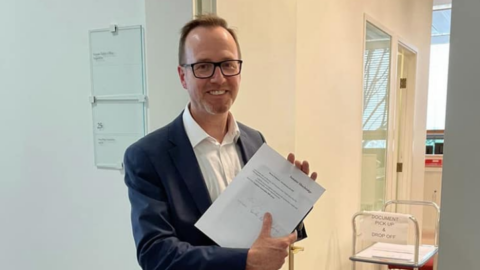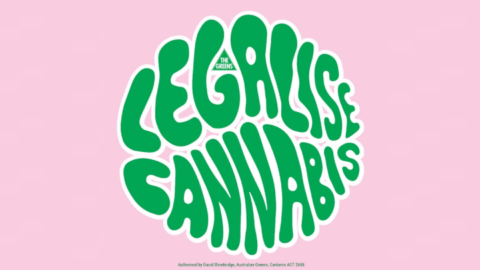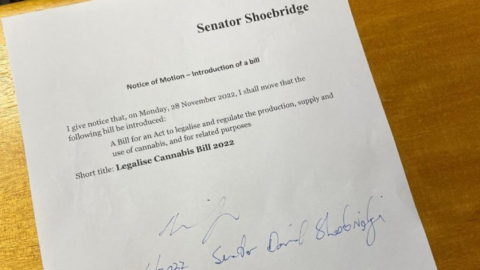Let’s Legalise It: Senator Shoebridge on Legislating Lawful Cannabis Nationwide

Since Australian Greens Senator David Shoebridge announced he’ll be introducing legislation into federal parliament with the aim of legalising cannabis for recreational use, there’s been a distinct feeling in the air that this is going to come to fruition.
And there’s also been a groundswell of Australians gleefully responding, “Yes, please.”
Gone are the days when locals bought the 1930s US Federal Bureau of Narcotics “reefer madness” propaganda. And this might have something to do with 19 US states, the capital Washington DC and the territory of Guam having already legalised the plant that’s been used for millennia.
Shoebridge announced on 26 September that he’d consulted with leading constitutional law expert Professor Patrick Keyzer, who’d confirmed that, despite questions circulating about this possibility, cannabis can indeed be legalised nationwide via federal parliament.
And on the following day, the Greens justice spokesperson gave notice that on 28 November, he’ll be introducing the Legalise Cannabis Bill 2022 into the Senate, which will “legalise and regulate the production, supply and use of cannabis”.
A fairly innocuous plant
No one is suggesting that cannabis is completely harmless. But in terms of popular psychoactive substances taken recreationally, it’s definitely down the low end of the scale on harms caused.
Unlike alcohol, the herb is not known to trigger violent behaviour, and nor can it kill you, like a couple of bottles of whiskey can. And no one’s pushing for a ban on alcohol. Indeed, there’s even a bar serving booze at Parliament House in Canberra – just ask Barnaby Joyce.
The National Drug Strategy Household Survey 2019 report outlines that 36 percent of Australians have used cannabis at one stage, while over 11 percent had used it in the last 12 months. And that regular use figure has hovered just above the 10 percent mark for years now.
According to Shoebridge, the major harm relating to cannabis at present is to do with its criminalisation and the consequences that brings in terms of coming into contact with law enforcement and the courts.
Over 90 percent of cannabis-related arrests in this country are for personal use. Legalisation means that the 10 percent of the population who do use it will no longer be criminals. And the general trend overseas is those who partake now will continue to, while very few nonusers will take it up.
The green rush
Of course, then there’s the tax revenue. Since the first retail sale in Colorado on 1 January 2014, the cannabis industry in that US state has raked in over $12.2 billion, and more than $2 billion of that has been in taxes. And last year saw over 35,500 locals employed in the industry.
Sydney Criminal Lawyers spoke to Greens Senator David Shoebridge about why legalising cannabis is a no-brainer.

David, you’ve obtained legal advice from constitutional lawyer Dr Patrick Keyzer, who’s confirmed that it’s possible to legalise cannabis nationwide at the federal level.
Why was it necessary to obtain this? And what’s the gist of what the lawyer told you?
This has never been done before: moving to legalise cannabis using the federal parliament, and in a single act of parliament, legalising cannabis across the country.
Traditionally, the regulation of drugs – normally, the criminalisation of drugs – has been seen as a state and territory issue.
However, law reform at a state and territory level, faces significant institutional resistance from the law and order lobby, most particularly the police and police unions.
So, we sought constitutional advice about whether the Commonwealth parliament could legalise cannabis.
I initially thought the external affairs power might be the avenue. But the advice we received from Patrick Keyzer, one of the leading authorities on constitutional law in the country, is the clearest route lies using the patents power and there’s clear legislative and case law precedence for that.
That means regulating cannabis by listing the various strains and using that patents power to create the market.
I’ve seen a few remarks on social media claiming there are more pressing matters to see to rather than cannabis legalisation.
Why is legal weed something we should be promptly getting across the line?
The fact is, having launched this campaign, we’ve had record levels of engagement with the party and engagement with my office.
There are hundreds of thousands, if not millions, of Australians very excited to finally get this long-awaited law change.
I would expect there would be a minority of right-wing commentators critiquing the timing. But what’s remarkable is, the traditional angry right-wing hate, based upon fearmongering, has almost disappeared.
All of the passion in this debate comes from the pro-legalisation side of the record.
The very twentieth century angry right-wing intolerant opposition is now pretty much reduced to complaining about the timing.
That’s a pretty good sign.

You gave notice in the Senate on 27 September that you’ll be introducing a bill to legalise cannabis. It’s being drafted, but it’s not the first time you’ve contemplated such laws.
Broadly, what are some of the likely aspects to the bill?
We’ve previously looked at the policing of cannabis at a state level and seen firsthand the kind of resistance you get there from state parliaments that are really trapped by the political and media power of the police and the police unions.
One of the real advantages in taking the debate to the federal parliament is we step away from that toxic law and order politics at the state level.
It gives us the chance to do some more blue-sky thinking about what the nature of a cannabis market would look like.
We are still consulting on the finer details of the licensing, marketing and sales arrangements in a legalised cannabis market.
Obviously, there will be prohibitions on the sale and provision of cannabis to minors.
My current thinking is to expressly prohibit Big Alcohol, Big Pharma and Big Tobacco from having any role in a legalised cannabis market, and to promote a very democratic grassroots model for the production of cannabis through grower cooperatives, which would provide very significant economic benefits, especially to the regions.
There are, however, a number of further policy details that we are genuinely consulting with, in terms of limits on marketing and point-of-sale arrangements that would be appropriate.
One of the other aspects worth highlighting is our current thinking is to allow for up to six plants to be grown per household for personal use.
Alcohol is associated with violence, especially the domestic kind. However, despite what the reefer madness propaganda asserted a century ago, cannabis generally makes people placid.
Can you talk about some of the harms that would be reduced by legalising cannabis?
For us, the core harm reduction benefit from legalising cannabis is getting the police, the courts and the criminal justice system out of young people’s lives, and not just young people, but people in the regions, First Nations peoples and people of colour, who are all traditionally overpoliced by police using cannabis as the excuse.
Too many young people have seen their lives thrown sideways – losing their career, facing thousands of dollars of legal costs, and sometimes gaol time – because they choose to have a joint with their friends or maybe share a bag of weed with their friends.
Legalising cannabis removes that harm in a single step.
We don’t pretend that cannabis is without any harm. But when you look at the spectrum of harm from different drugs, cannabis is on the less harmful end of that spectrum.
It’s far less harmful than alcohol and tobacco, and yet alcohol and tobacco are given a privileged legal status.
If you look at the research from Canada and the United States, one of the benefits – and it’s not statistically large – is a marginal substitution of cannabis for alcohol and a reduction in alcohol-related violence.
Canberra decriminalised the consumption and possession of cannabis two and a half years ago. And although it’s not a perfect model, as it does not deal with the supply side, no one ever mentions the fact that this has even happened.
Indeed, it seems that many Australians are unaware that it did. What does this tell us?
I credit the ACT Greens, who worked collaboratively with Labor in the territory, to decriminalise the possession of cannabis. That has been a successful experiment.
I was in Canberra only earlier this week and the sky is still very firmly up there above our heads.
Decriminalisation has seen no negative social repercussions. It has, however, seen a reduction in overt discretionary policing of young people, and that’s a positive.
Of course, a decriminalisation model only goes part way. It still has the market controlled and run by outlaw motorcycle gangs and organised crime.
Another core benefit of legalising it is it disempowers those criminal elements and brings the market into the legitimate part of the economy, which can produce jobs.
And I’ll be selfish here, from a politician’s point of view, it brings ongoing tax revenue.

So, David, you’ve launched the Let’s Legalise It campaign. You’ve given notice on your bill. What’s next from here? What are you aiming for in terms of seeing this on the ground?
We’re building the social support for the campaign. We’ve got a petition people are signing onto.
We’re pumping out materials from the office in the form of stickers and t-shirts, and we’re going through the process now of engaging with parliamentary council and stakeholders to get an initial draft of the bill out.
But we will also be holding a webinar in the future for cannabis campaigner training, because we want to democratise this campaign.
We want to see hundreds of thousands of Australians who want this done to be joining us in the campaign – helping shape the policy, helping persuade the parliament – so that we legalise cannabis in 2023.







